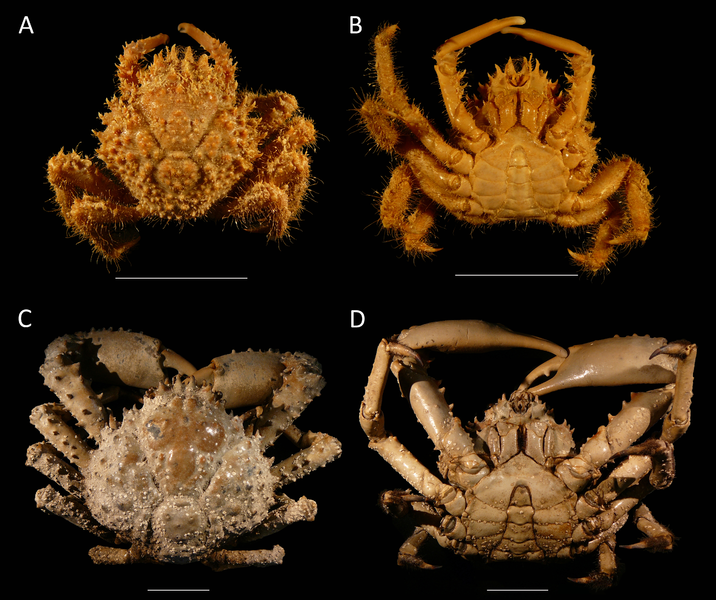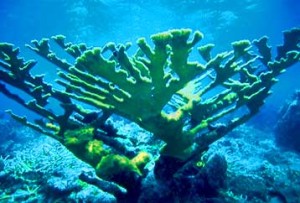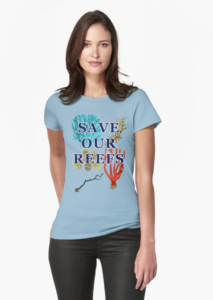Caribbean King crab could help save threatened coral reefs by keeping excessive seaweed growth under control, a promising new study claims. Experiments on the Florida Keys showed the Caribbean king crab is better than other species at removing overgrown seaweeds that threaten the reefs, by eating it.
When introduced to experimental plots on coral reefs, the greedy crab species reduced seaweed cover by 50 per cent, the experts found.
If the species could be boosted in the wild, it could help to combat the seaweed – which is spreading quickly due to climate change – and restore coral reefs, which have been projected to completely disappear by the year 2100.
Corals are threatened by warming waters, which leads to coral bleaching, as well as more acidic waters, pollution, disease and more.

This image shows a Caribbean king crab (Mithrax spinosissimus). This species is the Caribbean’s largest herbivorous crab and has a ‘powerful grazing capability’
‘Experimentally increasing the abundance of large native, herbivorous crabs on coral reefs in the Florida Keys led to rapid declines in seaweed cover and, over the course of a year or so, resulted in the return of small corals and fishes to those reefs.’
Overfishing, climate change, disease and eutrophication – overly-enriched waters leading to excessive growth of algae – have fuelled the supremacy of seaweeds on reefs, particularly in the Caribbean, researchers say.
‘The fleshy macroalgae (seaweeds) that occur on coral reefs have several negative effects on corals when the seaweeds are too abundant,’ Professor Mark Butler told MailOnline.
‘Those effects include taking up space on the reef that doesn’t allow new larval corals to settle and get established.’
Overgrowing seaweed also shades the corals from sunlight, which the coral’s own symbiotic algal cells need to survive.
Seaweed also releases chemicals that stress coral, which reduce coral reproduction and makes coral more susceptible to disease.
Researchers monitoring corals. The team conducted their experiments twice and found promising results both times
In Caribbean waters, many reefs have undergone ‘an ecological phase shift’, so that seaweeds now dominate previously coral-rich reefs.
Seaweed ‘negatively influences the growth, reproduction, recruitment, and survival of corals’, researchers say, as the two are in competition.
Seaweed overgrowth also promotes proliferation of reef sponges – simple aquatic animals with dense, yet porous, skeletons – in a ‘vicious circle’ of nutrient cycling between seaweeds and sponges, which is to the detriment of corals.
Butler and colleagues have been studying the coral reef and other habitats in the Florida Keys – the string of tropical islands stretching about 120 miles off the southern tip of the US state – for more than 30 years.
Butler’s familiarity with the location helped his team to recognise the under-appreciated role of a little-known, mostly nocturnal Caribbean King crab (Mithrax spinosissimus).
This species is the Caribbean’s largest herbivorous crab and has a ‘powerful grazing capability’.
It eats an impressive amounts of seaweed at rates that rival all other Caribbean species of fish and invertebrates and also eats seaweed that other species avoid.
Caribbean King crabs aren’t naturally present in large enough numbers to keep the seaweed under control.
But the researchers wondered whether the crabs could restore balance if it were possible to boost their numbers.
The team conducted two experiments sequentially at separate locations about nine miles apart in Florida Keys, within 12 isolated patches of coral reef.
Researchers monitoring corals, which are threatened by warming waters, leading to coral bleaching, as well as more acidic waters, pollution, over-fishing and disease
The reefs were split into three groups – ‘unmanipulated control reef’ that they left alone but used as a reference, ‘reefs stocked with crabs’, and reefs on which divers scrubbed the reef to remove seaweed and algae before adding crabs.
At the start, 85 per cent of the reef in all was covered with seaweed, and this figure hadn’t changed a year later on the reef they left alone.
But the addition of crabs put a big dent in the seaweed, dropping it to less than 50 per cent cover.
In the final treatment, in which reefs were scrubbed first, seaweed cover dropped by about 80 per cent, but the effect was only short-term unless crabs were also introduced.
The team then performed the experiment again at the second location, which showed ‘similarly impressive results’.
The total initial seaweed coverage on the second set of reefs was lower for this second experiment – 65 per cent – but yielded ‘nearly identical results’.
For this repeat experiment, crabs alone reduced seaweed cover by about 50 per cent, and by scrubbing the reef first, seaweed declined by about 70 per cent.
The findings show that herbivorous crabs can be used as another tool for coral reef restoration, which can complement the common approach of transplanting coral fragments onto degraded reefs.
This approach helps bolster coral biomass and sexual reproduction of corals, but this far it has not returned reefs to their former state.
‘Some argue that unless the underlying reef habitat is unencumbered by the overgrowth of seaweeds, reefs will remain largely depauperate of live coral and suffer degraded ecosystem function,’ Butler and his study co-author Angelo Jason Spadaro write in their research paper, published in Current Biology.
This image shows example reefs covered in seaweed and after being scrubbed by hand and ‘cleaned’ by crabs
The composition of coral reefs in the Florida Keys has been stable over the last 8,000 years but is declining rapidly due to threats faced.
 For example, the third longest barrier coral reef in the world that fringes the Florida Keys now has less than 2 per cent coral cover, a fraction of what it was just a few decades ago.
For example, the third longest barrier coral reef in the world that fringes the Florida Keys now has less than 2 per cent coral cover, a fraction of what it was just a few decades ago.
‘One wonders what the tropics would be like without the mind-boggling complexity and beauty of shallow coral reefs,’ said Butler.
‘Conquering the challenge of climate change coupled with local reef restoration, like development of stocking programs for herbivorous crabs, are immediately necessary to reverse this decline.
‘Our findings mean little if they don’t result in tangible new restoration efforts.’
Already coral nurseries have been established to help restore the reef, but to put the new findings into action will require setting up nurseries to raise large numbers of crabs – something the researchers are now trying to find the resources for.
Source: Seaweed-munching crabs could help save coral reefs, study says | Daily Mail Online

